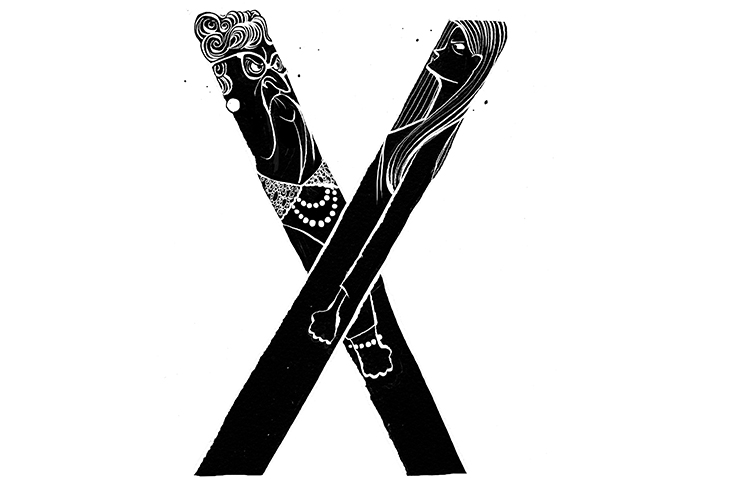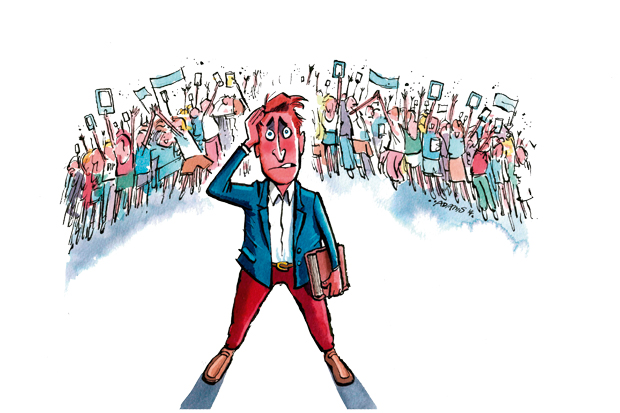British general elections have often evolved from contests between parties into battles between two opposing themes or ideas. In 1964, it was modernity vs the grouse moors; 1979, trade unionism vs individualism; 1983, Cold War strength vs unilateral nuclear disarmament. This year was supposed to be the Brexit election, yet instead developed into something loosely associated with that, but at the same time quite different: it became the intergenerational election.
Jeremy Corbyn was never supposed to have had a shout. Way to the left of any Labour leader who had ever won a general election, his economic policies were considered by many to be simply incompatible with the values of the modern, aspirational British population. Hadn’t Tony Blair proved that for a left-of-centre party to win power it is necessary first to renounce socialism; or at least to use that term as a cover for what is really social democracy?
But then came the manifestos, and the dramatic narrowing of the polls. Ostensibly, the shift in opinion was coming from the elderly, who were upset by the prospect of having to use the value of their homes to pay for their care costs. Yet the polling returns tell a different story. While there was certainly some shift in the elderly vote towards Labour, it was not nearly as dramatic as among the young. An ICM poll on 18 April, at the beginning of the election, put the Conservatives ahead with 60 per cent of the over-75 vote and Labour on just 4 per cent. By 29 May, the Tory lead had softened to 52 per cent against Labour’s 18 per cent. Among 18-24-year-olds, the earlier poll had Labour ahead with 28 per cent and the Tories on 16 per cent. But by 29 May, Labour’s support among the youngest voters had rocketed to 61 per cent while the Tories had fallen back to 12 per cent.
These figures do need to be treated with extreme caution. It will be some time before we have an analysis of how different age groups voted and, in the meantime, we have just opinion polls, which have proved extremely variable in recent years. More-over, the small sample sizes for particular age groups make it very difficult to rely on the figures. The ICM poll for 29 May, for example, had a total sample size of 1,000, of whom only 108 were aged 18-24.
There is, however, enough evidence to see that there has been a marked shift in political opinion among the young in recent months. It wasn’t so long ago that capitalism seemed to have claimed western youth for good. They were no longer throwing brickbats at bourgeois society as in the 1960s, nor lionising left-wing heroes such as Che Guevara or the Sandinistas of Nicaragua. University life seemed to have evolved from being a time of youthful irresponsibility to one of serious study and preparation for a career.
As recently as 2015, British youngsters were not especially attracted to the left. A YouGov analysis of the election of that year suggested that 36 per cent of 18-29-year-olds voted Labour and 32 per cent Conservative. YouGov’s recent polling focuses on a slightly different age group, so isn’t directly comparable, but a poll on 2 June suggested that among 18-24-year-olds Labour was leading the Conservatives by a whacking 71 per cent to 15 per cent. YouGov suggests class is no longer a good predictor of voting intentions — the factor which determines which way you are likely to vote is age.
We all heard the whooping among young members of the audience in the TV debates. Corbyn achieved something which neither Ed Miliband nor Gordon Brown could ever have achieved, and which even Tony Blair would have struggled with: to be cheered at a rock concert, by the Libertines on 20 May. It is an irony that the oldest leader to take one of the two main parties into a general election since Michael Foot in 1983 has been more successful than any in garnering the votes of the young.
Why? A lot of election coverage focused on the negative appeal of the Conservatives’ social policy, but a more significant reason for Labour’s mid-campaign boost was surely Corbyn’s promise to abolish student tuition fees. We saw with the Liberal Democrat collapse in 2015 just how important an issue that was with young voters. The Lib Dems had done well with young voters in 2010 on Clegg’s pledge to abolish tuition fees. By giving his blessing to trebling fees instead of abolishing them, he set his party back electorally by 40 years. This time around, the Lib Dems offered nothing on tuition fees and seemed to pitch for the youth vote instead with the promise of reversing Brexit and legalising cannabis — neither proved to have great appeal.
But it isn’t just the fees issue that is boosting Labour’s reputation with young voters. Across the developed world there is a growing antipathy towards capitalism among the young — this is now widespread, rather than restricted to the noisy protests which anti-globalisation activists used to stage every May Day until post-9/11 security made life difficult for them. Last year, the Harvard Institute of Politics held a spring poll among Americans aged 18-29, asking them if they ‘supported’ capitalism. Remarkably, in the most capitalistic society on earth, only 42 per cent said they did. By contrast, 33 per cent said they supported socialism. The youth vote was the secret ingredient of Bernie Sanders’s near defeat of Hillary Clinton in the 2016 primaries — in the same Harvard survey 54 per cent said they had a favourable impression of him. It was another case of a white-haired leftist gaining far greater support among the young than in his own age group.
In France, too, the young headed leftwards. Among the 18-24 group the big winner in the first round of this year’s presidential election, with 30 per cent of the vote, was Jean-Luc Mélenchon, the free-spending leftist candidate who wanted a top rate of income tax of 90 per cent. Of the other candidates, 18-24s favoured Marine Le Pen, pushing Emmanuel Macron into third place. He supposedly represented everything that was young and dynamic, open and inter-national about France, but it wasn’t a vision shared by French students, who plumped for anti-globalisation candidates on either wing.
It is not hard to understand some of the economic pressures which have led young people to lose faith in capitalism. A study by the Resolution Foundation last year found that people born between 1981 and 1985 are earning £40 a week less in today’s terms than people born a decade earlier earned at the same age, making them the first generation since the Industrial Revolution to suffer such a reverse. Meanwhile, the cost of housing has soared beyond their reach. Over the past five years, according to the Nationwide, the rate of home ownership among 30-34s has plunged from 49.3 per cent to 43.1 per cent — while older people have enjoyed higher rates of home ownership.
Moreover, high rents have stopped many young people putting aside any kind of savings or investments, making it impossible to profit from the boom in the stock market. If you cannot win a stake in the capitalist system, in spite of working hard, why should you support it?
Neither have the under-35s been exposed to the negative images of socialism familiar to older generations. Among my age group, growing up in the 1970s and 1980s, socialism was inescapably associated with the failures of the Soviet bloc: it conjured up images of queuing half a day for a cabbage, putting your name down on a long waiting list for the prize of a choking, belching Trabant — and of getting shot if you tried to escape. To my generation, capitalism was synonymous with freedom. But I am not sure that holds for a generation who see only large, tax-dodging corporations and bankers who wrecked the economy yet carried on skimming off vast bonuses.
Nor, when reading of Jeremy Corbyn’s renationalisation plans, do the under-35s have memories of Britain’s nationalised industries in the 1970s. They don’t recall the three-day week, the Winter of Discontent, dirty, late trains, or realise that the chaos on Southern Railway was once symptomatic of labour relations in huge swaths of the state sector. All they see are overpriced trains run by companies which ruthlessly exploit the monopolies they were granted in this, the most botched of the privatisations.
Corbyn’s past support for the IRA means little to them because they don’t recall the Troubles. They saw the late Martin McGuinness meeting the Queen, so they don’t see why should they get excited about Corbyn meeting McGuinness and Gerry Adams 30 years earlier. They take Corbyn’s word for it when he tells them he was just a man before his time — they don’t see a former troublemaking young MP choosing to attend events where the murderers of British citizens were honoured.
There may still be an element of truth in the old dictum, often falsely attributed to Churchill, that anyone who isn’t a socialist at the age of 25 doesn’t have a heart and anyone who isn’t a conservative by the age of 35 doesn’t have a head. People have long tended to drift rightwards as they get older. But the gradual change of political colour has always been accompanied — driven, even — by the acquisition of wealth. No one can assume that will still hold if so many 35-year-olds find themselves unable to acquire capital.
Sooner or later the right is going to have to address this disassociation of the young from capitalism. It will not be possible to continue to preach the benefits of the free market if it is patently not working in favour of an entire generation. By the next election, the current generation of under-35s will comprise nearly half the population. If they have a sense that the economic system is rigged against them, they will revolt against it. Some means needs to be found of allowing them to acquire a stake in capitalism — and not a quick fix like George Osborne’s ‘help to buy’ scheme, which threw public money at one lucky group of homebuyers at the expense of inflating prices even more for subsequent generations.
Yet still I wouldn’t be surprised if the Conservatives take the wrong message from this bruising election campaign. The very worst thing they could do now is to think, ‘Oh look, we struggled because we upset the elderly by threatening to charge them for their care’— and then come up with yet more wheezes to promote the interests of the over-70s at the expense of the young. That will have only one result — to help bring back socialism with a vengeance.
Got something to add? Join the discussion and comment below.
Get 10 issues for just $10
Subscribe to The Spectator Australia today for the next 10 magazine issues, plus full online access, for just $10.
You might disagree with half of it, but you’ll enjoy reading all of it. Try your first month for free, then just $2 a week for the remainder of your first year.















Comments
Don't miss out
Join the conversation with other Spectator Australia readers. Subscribe to leave a comment.
SUBSCRIBEAlready a subscriber? Log in